- Last Updated: December 16th, 2025
Key Takeaways
A multidimensional approach is necessary to safeguard children in the digital space.
Caregiver engagement and critical thinking skills are key to a child's online safety.
Continuous effort by various stakeholders is required to construct protective measures.
Why Protecting Children from Social Media Harm Matters
On this page, we’ll discuss an overview of protecting children from social media harm, strategies for safe social media use, legal action taken against social media harm, and much more.
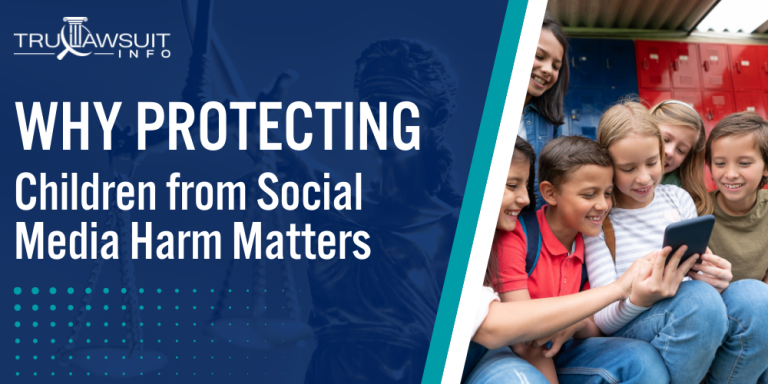
Intro to Protecting Children from Social Media Harm
Here are some key strategies employed to enhance the safety of children on social media:
- Education: Both parents and children need to be informed about the dangers of social media.
- Privacy Settings: Utilizing privacy settings effectively can prevent unintended sharing of information.
- Legislation: Laws like the proposed Protecting Kids from Social Media Act, introduced by a bipartisan group of senators, highlight government involvement in protecting minors online.
- Awareness Campaigns: Organizations such as UNICEF advocate for awareness and preventive measures against the detrimental effects of healthy online environments.
If you or a loved one has experienced mental health issues potentially related to social media use, you may be eligible to receive compensation.
Contact TruLawsuit Info using the chat feature on this page for a free case evaluation to determine if you qualify for a social media mental health lawsuit.
The Negative Impact of Social Media on Children's Mental Health
Social media platforms, while offering various forms of engagement, present significant challenges to youth mental health.
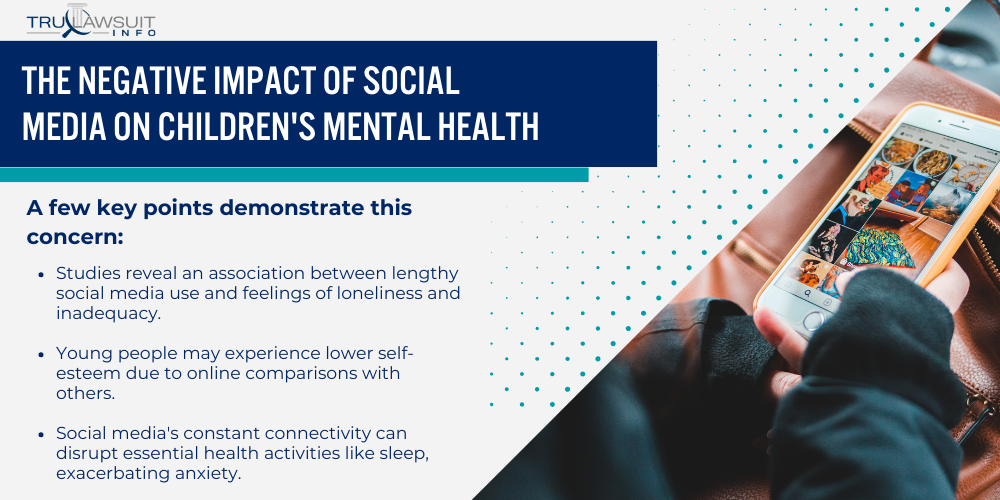
Research consistently connects extensive social media use with adverse mental health crisis outcomes.
Increased Risk of Depression and Anxiety
Children and adolescents who spend considerable time on social media sites may have a heightened risk of depression and anxiety.
A few key points demonstrate this concern:
- Studies reveal an association between lengthy social media use and feelings of loneliness and inadequacy.
- Young people may experience lower self-esteem due to online comparisons with others.
- Social media’s constant connectivity can disrupt essential health activities like sleep, exacerbating anxiety.
- Youth reported that negative online interactions contributed to persistent adverse moods.
Exposure to Cyberbullying and Online Harassment
The digital age, while connecting the world, has also opened new avenues for bullying to transcend physical spaces, reaching children even in the safety of their homes.
This pervasive issue not only disrupts everyday life but also significantly impacts the emotional well-being of young individuals.
A notable aspect of online exploitation is the prevalence of cyberbullying and how it affects children’s mental health:
- Online harassment has been experienced by many adolescents, leading to fear, distress, and avoidance of social media.
- Victims may face a variety of bullying forms, including personal attacks, shaming, or spreading rumors.
- The spread of negative content can result in long-term psychological trauma.
- Protecting children from these threats involves awareness and proactive measures to ensure online safety.
The Addictive Nature of Social Media Platforms
Social media platforms are engineered to captivate users, especially the younger demographic, by creating a loop of constant engagement.
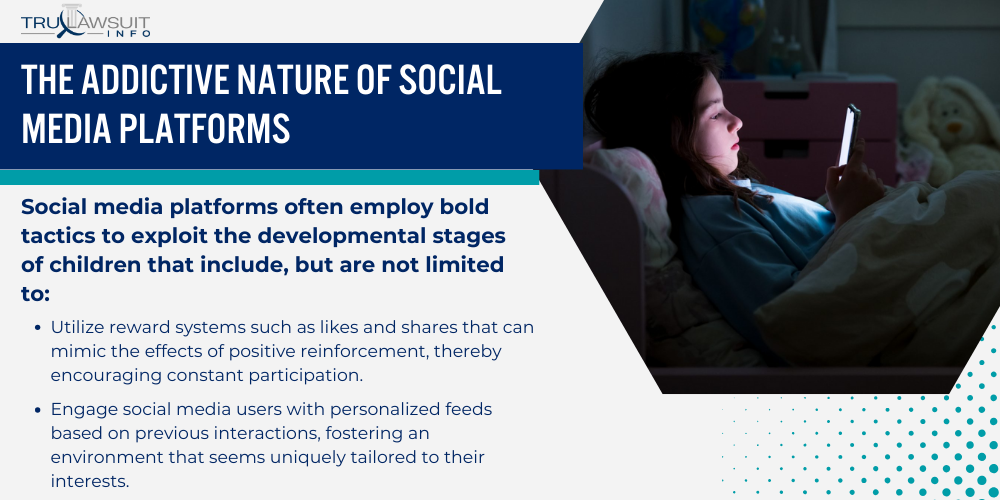
The design choices and algorithms used by these platforms can lead to addictive behaviors in children, impacting their development and overall well-being.
Exploiting Psychological Vulnerabilities in Children
The digital landscape is fraught with designs and mechanisms specifically crafted to exploit the inherent vulnerabilities of developing minds.
With their still-forming cognitive and emotional capabilities, children are particularly susceptible to these calculated digital strategies.
Social media platforms often employ bold tactics to exploit the developmental stages of children that include, but are not limited to:
- Utilize reward systems such as likes and shares that can mimic the effects of positive reinforcement, thereby encouraging constant participation.
- Engage social media users with personalized feeds based on previous interactions, fostering an environment that seems uniquely tailored to their interests.
- Design features like infinite scrolling and auto-playing videos that make it difficult for children to disengage.
- Encourage the development of online personas, which can become a source of anxiety and pressure to maintain a certain image or popularity level.
Encouraging Excessive Screen Time and Sedentary Behavior
Screen time is a hot topic when it comes to healthy social media use.
Consider how social media platforms may lead to an imbalance between online and offline activities:
- By creating a loop of content consumption, they increase the chances of longer periods spent on platforms without active engagement in offline pursuits.
- The constant stream of notifications can disrupt other activities and draw children back into a safer online environment.
- Some platforms introduce games or challenges that can encourage prolonged periods of sedentary behavior.
- There is often a lack of built-in features to promote breaks or establish healthy technology boundaries for children, leaving it up to them or their guardians to monitor and limit use.
The Dangers of Online Predators and Inappropriate Content
Social media platforms can be a playground for online predators and a display window for inappropriate content.
Both parents and youngsters must be aware of the risks associated with these digital environments.
The Importance of Digital Literacy and Critical Thinking Skills
To safeguard children in the social media world, they must learn digital literacy and critical thinking.
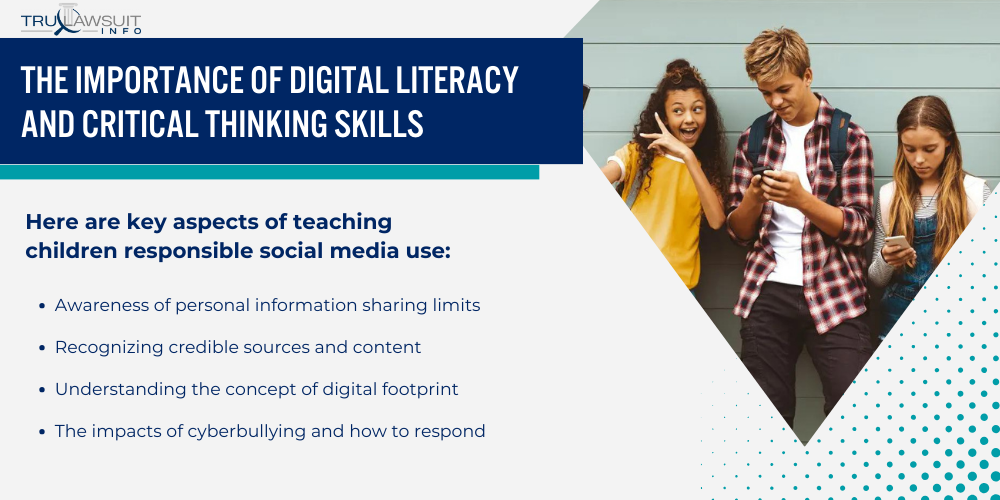
These skills enable young users to participate online in a thoughtful and secure manner.
Teaching Children to Navigate Social Media Responsibly
Digital literacy involves being able to use digital tools safely and effectively.
For children, learning responsible use of social media is vital.
It helps them understand the implications of their online actions and fosters a respectful online environment.
Here are key aspects of teaching children responsible social media use:
- Awareness of personal information sharing limits
- Recognizing credible sources and content
- Understanding the concept of digital footprint
- The impacts of cyberbullying and how to respond
Encouraging Healthy Skepticism and Fact-Checking Habits
A critical aspect of media literacy curricula is the ability to evaluate information.
Children should learn not to accept all online content at face value and, instead, develop fact-checking habits.
Key steps in promoting critical thinking in children include:
- Questioning the origin of the information
- Comparing information across various social media platforms
- Using trusted tools and resources to verify facts
- Engaging in discussions about recognizing misinformation
By equipping children with digital literacy and critical thinking skills, they can become responsible online participants.
This preparation helps them address online abuse and contributes to the wider community’s well-being on social media platforms.
The Role of Parents in Monitoring Social Media Use
Parents play a pivotal role in guiding and protecting their children in the digital world.
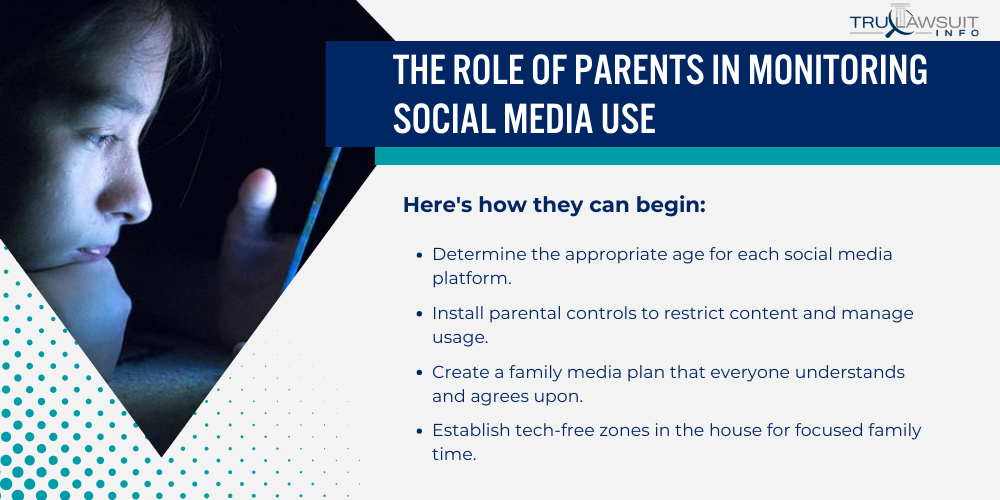
They establish healthy technology boundaries and develop protective strategies to safeguard their children from potential harm.
Setting Age-Appropriate Boundaries and Guidelines
When setting social media boundaries, parents need to assess what’s suitable for their child’s age.
Here’s how they can begin:
- Determine the appropriate age for each social media platform.
- Install parental controls to restrict content and manage usage.
- Create a family media plan that everyone understands and agrees upon.
- Establish tech-free zones in the house for focused family time.
Maintaining Open Communication and Trust with Children
It is essential for parents to establish and maintain a dialogue that allows children to feel safe discussing their online interactions and the emotions they stir.
This ongoing conversation helps to create an environment where children can openly express concerns about their digital lives without fear of judgment or repercussions.
To foster trust and open communication, parents should:
- Encourage their children to share their online experiences and concerns.
- Discuss the importance of protecting personal information online.
- Empower kids to foster in-person friendships and balance screen time with real-world interaction.
- Regularly review and update the family’s approach to social media use together.
Through these actions, parents can help protect their children from the risks associated with social media while encouraging positive, real-life relationships and experiences.
The Responsibility of Social Media Companies to Protect Minors
Social media entities have an imperative role in crafting an online environment that prioritizes the well-being of young users.
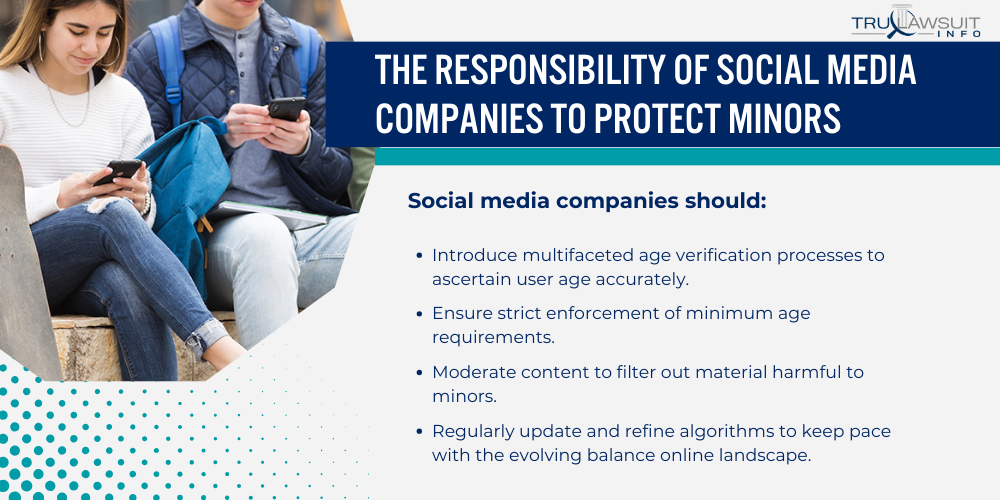
They are expected to deploy effective and timely systems for safeguarding minors, as well as allowing for transparent and independent assessments to gauge the efficacy of these measures.
Implementing Robust Age Verification and Content Moderation
Age verification systems are pivotal in restricting access to age-inappropriate content and safeguarding minors from online risks.
Social media companies should:
- Introduce multifaceted age verification processes to ascertain user age accurately.
- Ensure strict enforcement of minimum age requirements.
- Moderate content to filter out material harmful to minors.
- Regularly update and refine algorithms to keep pace with the evolving balance online landscape.
Content moderation is also vital.
Companies must:
- Utilize advanced AI coupled with human oversight to oversee user content.
- Respond to reports of inappropriate or harmful content promptly.
- Engage in continuous improvement of moderation tools and practices.
- Establish clear guidelines on what constitutes acceptable content for various age groups.
Collaborating with Experts and Policymakers to Develop Solutions
To further enhance research coordination and develop global standards, it is crucial for social media platforms to work with a spectrum of international partners.
They need to:
- Partner with mental health experts to understand the impacts of social media on youth.
- Cooperate with policymakers to shape regulations that reflect contemporary challenges.
- Create forums for sharing best practices and research findings.
- Prioritize user health in all policy and design implementations.
Open dialogue and cooperation foster innovative solutions to complex challenges, ensuring social media platforms remain safe for their youngest members without stifling the exchange of ideas and beneficial interactions that can enrich their lives.
The Need for Comprehensive Legislation and Regulation
Recent legislative efforts indicate a clear acknowledgment of the necessity for robust legal frameworks to ensure the safety of children on social media platforms.
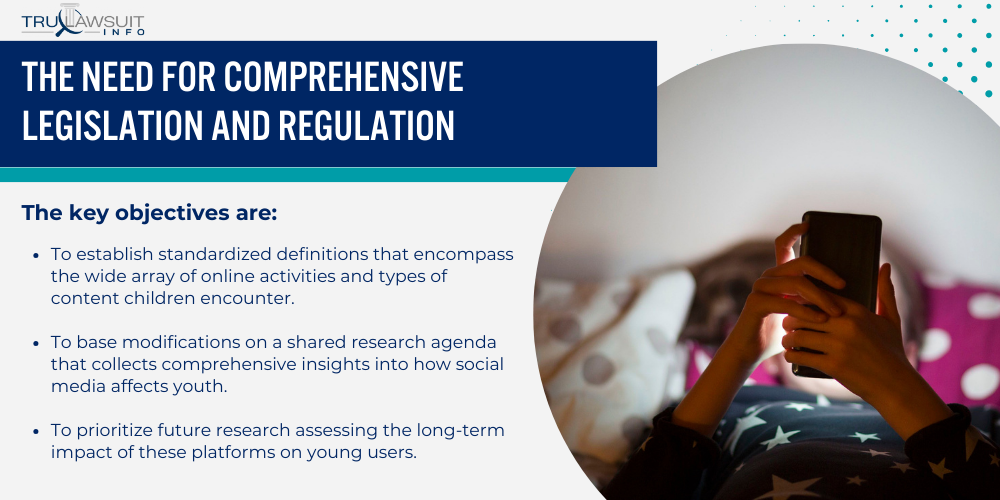
Children’s exposure to potentially harmful content and online abuse has raised significant concerns among parents, scholars, and policymakers alike, pushing the agenda toward updating laws and enforcing stringent penalties for non-compliance.
Updating Existing Laws to Address Social Media Challenges
To mitigate the risks children face on social media, legislators are working to revamp existing laws to catch up with the digital age’s fast-paced changes.
The key objectives are:
- To establish standardized definitions that encompass the wide array of online activities and types of content children encounter.
- To base modifications on a shared research agenda that collects comprehensive insights into how social media affects youth.
- To prioritize future research assessing the long-term impact of these platforms on young users.
- To ensure these updates effectively address the evolving nature of potentially harmful content such as cyberbullying and exposure to inappropriate material.
Enforcing Penalties for Platforms that Fail to Protect Children
The enforcement of penalties against companies that do not safeguard underage users is becoming a focus of public policy.
It is considered essential that:
- Social media accounts implement stringent measures to shield minors from online risks.
- Authorities hold platforms accountable through clear and enforceable penalties for non-compliance.
- Social media companies are encouraged to take proactive measures to detect and mitigate dangers before they reach children.
- A research priority is set on exploring the most effective regulatory measures to ensure compliance without stifling innovation.
Legislation like the Protecting Kids on Social Media Act exemplifies attempts to transform concerns into action by making platforms accountable for user age verification.
Simultaneously, state legislation continues to evolve, as seen with the Social Media and Children 2023 Legislation and its continuous updates year by year.
The Potential for Positive Uses of Social Media for Children
Social media can benefit children when used in moderation and under appropriate supervision.
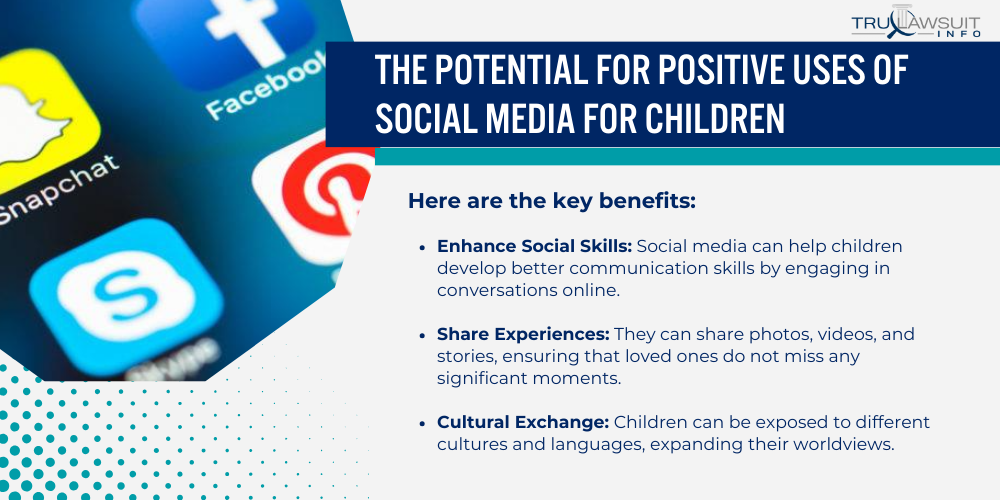
It can facilitate meaningful connections and enrich learning experiences.
Connecting with Friends and Family Across Distances
Social networking sites offer children the chance to stay in touch with friends and family who are far away and strengthen bonds and maintain relationships over distances.
Here are the key benefits:
- Enhance Social Skills: Social media can help children develop better communication skills by engaging in conversations online.
- Share Experiences: They can share photos, videos, and stories, ensuring that loved ones do not miss any significant moments.
- Cultural Exchange: Children can be exposed to different cultures and languages, expanding their worldviews.
- Support Networks: For those who may feel isolated, social media can act as a bridge, connecting them to a community of peers.
Accessing Educational Resources and Support Communities
Social media can be a repository of educational resources and can provide access to support communities.
Children can benefit from:
- Diverse Learning Materials: They have access to a plethora of information and educational content such as tutorials, lectures, and articles.
- Peer Collaboration: Children can collaborate on homework and projects, sharing ideas and resources in real-time.
- Health Advice: Reputable healthcare providers sometimes offer guidance, allowing for better healthy practices.
- Support Programs: Online forums and groups provide support for various challenges, contributing to healthy development.
Frequently Asked Questions
-
Parents can establish clear guidelines and time limits to foster healthy social media use.
Engaging in open conversations regarding online behaviors helps build trust and guide children to use social media responsibly.
-
Technology companies should enhance safety features and create age-appropriate content filters.
They also need to design transparent platforms that provide easy reporting mechanisms for abuse or harmful content.
-
Exposure to cyberbullying, inappropriate content, and data privacy issues are major risks to children.
Mitigation includes robust privacy settings, user education, and proactively monitoring for harmful content.
-
Setting shared usage times or using family-friendly apps permits visibility into children’s online activity without being overly intrusive.
Maintaining a balance between oversight and trust is key to respectful monitoring.
-
Children can learn about potential addiction through structured educational programs and by parents illustrating the importance of a balanced digital diet.
Emphasizing creative and physical activities outside of the digital world helps prevent addiction.
-
Arguments for parental control often stem from concerns about safety and exposure to mature content.
Conversely, arguments against it may be based on children’s rights to privacy and the importance of developing independent decision-making skills.

Attorney Jessie Paluch, founder of TruLawsuit Info, has over 25 years of experience as a personal injury and mass tort attorney, and previously worked as an international tax attorney at Deloitte. Jessie collaborates with attorneys nationwide — enabling her to share reliable, up-to-date legal information with our readers.
Legally Reviewed
This article has been written and reviewed for legal accuracy and clarity by the team of writers and legal experts at TruLawsuit Info and is as accurate as possible. This content should not be taken as legal advice from an attorney. If you would like to learn more about our owner and experienced injury lawyer, Jessie Paluch, you can do so here.
Fact-Checked
TruLawsuit Info does everything possible to make sure the information in this article is up to date and accurate. If you need specific legal advice about your case, contact our team by using the chat on the bottom of this page. This article should not be taken as advice from an attorney.
You can learn more about the Social Media Harm Lawsuit by visiting any of our pages listed below:
Here, at Tru Lawsuit Info, we’re committed to helping victims get the justice they deserve.
To do this, we actively work to connect them with attorneys who are experts in litigating cases similar to theirs.
Table of Contents
Tru Lawsuit Info is a reliable source of information about issues that may affect your health and safety, such as faulty products, data breaches, and environmental hazards.
Our team of experienced writers collaborates with medical professionals, lawyers, and advocates to produce informative articles, guides, and other resources that raise awareness of these topics.
Our thorough research provides consumers with access to reliable information and updates on lawsuits happening around the country. We also can connect consumers with attorneys if they need assistance.
Here, at Tru Lawsuit Info, we’re committed to helping victims get the justice they deserve.
To do this, we actively work to connect them with attorneys who are experts in litigating cases similar to theirs.
